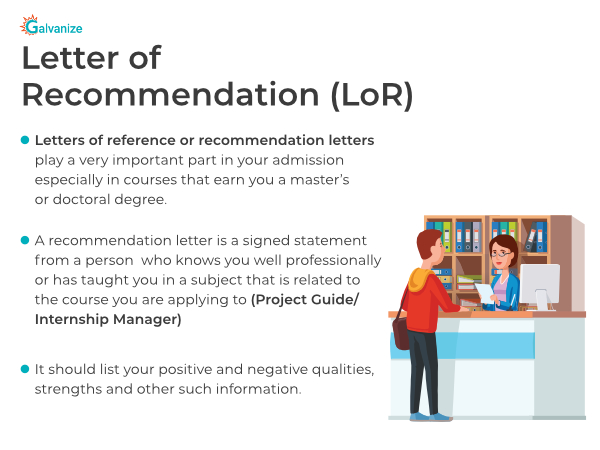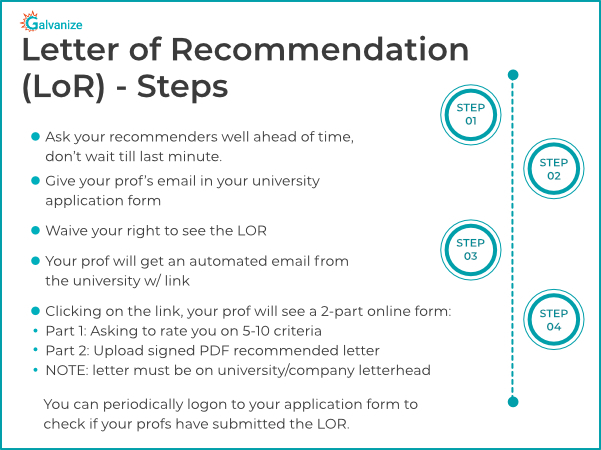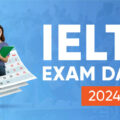
The How-To Guide
Letter of Recommendation-LOR | Format, template, samples and examples
Letter of Recommendation (LoR) work for you when they present you in the best possible light, showcasing your skills and abilities.
But that brings up the question:
How do you get the most impactful LoR’s from the most relevant people?
Some might be wondering about “What LOR is”, it’s full form and “how to write lor”, ” Sample and example letter of recommendations”, and if there would be a specific way to write lor for the required degree and industry that you are in.
We will discuss in detail about what LoR is, why it’s important and how it can play a very significant role in getting you your dream admission! Read till the end
Table of Contents
1 What is an LOR? What does an LOR mean? What is it’d full form and significance
• Importance of LOR
• Types of Letter of Recommendation
2 How to ask for a Letter of Recommendation
3 How to write a Letter of Recommendation
• Important points for remembered for a better LOR
• Letter of Recommendation Format
4 Steps to getting an LoR
5 Do’s & Dont’s of a Stellar Letter of Recommendation
6 Must Have Qualities of a fine LOR
7 How We do it at Galvanize
Chapter 1
What is an LOR? What does LOR mean? What is it'd full form and significance
The full form of LOR is the Letter of Recommendation.
A Letter of Recommendation is a signed statement from a person who knows you well professionally or has taught in a subject that is related to the course you are applying to.
Simply an LOR is a document written by the recommenders who can assess your skills, qualities, and capabilities as a part of your university admission application.
These LORs are specifically requested to be written where you need to choose the recommenders on your own.

Why is a Letter of Recommendation important?
We have seen most of the students giving more importance to the statement of purpose and less to the letter of recommendation. Almost every university asks for the letter of recommendation prior to the statement of purpose. LOR is given more importance because it is a letter written about you by your professor/manager.
The universities refer your letter of recommendation as the validation of your achievements and academic/professional skills that you pursue which will convince them that you can excel in your academics.
Particularly letter of recommendation from the well known figures who have done their Ph.D will be given more weightage and can make stand out.
[bctt tweet=”Good LOR consist of : Leadership, communication skills, capabilities & accomplishments, student/employee improvement over time and relationship with the student/employee” username=”galvanize_prep”]
The best letter of recommendation should display :
- Leadership and communication skills.
- Capabilities and accomplishments.
- Student/employee improvement over time.
- Relationship with the student/employee.
Types Of Letter Of Recommendation:
We all have seen what a Letter of Recommendation is, now let’s see what are the different types of LoR’s and where are they used. There are two types of Letters of Recommendation.
- Academic LOR (Used by students)
- Professional LOR (Used by employees)
1. Academic Recommendation Letter:
An Academic Letter of Recommendation is a document obtained by students from their professors.
The Professors write about all the skills and achievements of that particular student which then can be used by the student as a reference in the university’s admission process.
If you are applying for your Bachelor’s, you must get a Letter of Recommendation from your teachers at school.
If you are applying for your Master’s, you must get an LoR from your professors at college.
Apart from your strengths and achievements, the recommendation letter also provides validation about your background, all of which can play a major role in the admission process.
So, choose your recommenders accordingly and ensure that you have a strong LoR.
TIP – It is best if you approach your recommender’s well in advance as a lot of people might rush to the same professor and you might lose out a chance of getting recommended by someone of your choice.
2. Professional Letter of Recommendation:
Several MBA programs abroad require a certain number of years as work experience from every applicant. In such cases, an Academic reference letter alone will not create a strong impact on your profile, which is why you must ensure you get a Professional Letter of Recommendation from the companies you worked in.
This recommendation letter will speak about your work and other projects you worked on while you were at the company. Apart from work-experience, universities judge every student on several other factors too. They are
- Communication Skills
- Work Experience
- Field-based Experience
- Analytical Skills
- Leadership Qualities
- Knowledge Base
You must ensure that most of these points are covered in your Letter of Recommendation as these factors play a huge role in impressing the universities.
[bctt tweet=”There are two types of LOR : Academic recommendation letter and professional recommendation letter” username=”galvanize_prep”]
Letter of Recommendation for Graduate School:
Whether you have taken GRE or TOEFL exam Letter of Recommendation plays an important role in your graduate school admission process.
How is the letter of recommendation actually different? The most important aspects of your application for graduate school rely a lot on what you have to say about yourself – right from your transcript to your resume and your statement of purpose.
This isn’t true of letter of recommendation – here is when you have to get other peoples opinions of you.
Now who are these people and how do you make this happen? First and foremost, you need to select a recommender carefully.
They play a very important role in the admission decisions, whether you’re applying for a Master’s program or a doctoral program.
With a letter of recommendation for graduate school, the most important point is they have to be taken from people who know you professionally.
You don’t want to take this letter of recommendation from peers or people who know you personally.
Not for nothing that you’re always hearing the sage advice to better be in their good books.
Letter of recommendation is the most important part of the graduate school admission process and they have the power to compensate the low GRE scores.
Once the admission process for a University starts they are flooded with number of applications where you find a huge competition with scores.
In such cases it is the Letter of Recommendation also called as Reference Letter or Admission Essay which makes you stand out these applicants.
An Admission Essay will have a combination of all your strengths, weaknesses, leadership qualities and capabilities.
As a whole this talks about your personality which a University shows keen interest.
A bad reference can turn an admission decision. After all, it is other people’s opinion about you that also matters in securing that coveted ADMIT!!
Chapter 2
How to ask for a LOR ( Letter of Recommendation )?
When it comes to LoR’s, asking for one can seem daunting.
On an average, when you’re applying for a Masters or a Phd program, you will require three such letters of recommendation.
So you’ll have to identify these three people who can give you the letters of recommendation you need.
-
Choose the right recommender:
Since LOR is all about someone writing about you, you must have a strong relationship with this person.
Ask the professor or the superior with whom you worked extensively on a thesis or a project.
He/she ought to be able to testify and write about your strengths, accomplishments, and capabilities with examples.
When looking for the best recommender, the most important thing to keep in mind is that the recommendation letter should add value to your application to graduate school in terms of the relevancy of the program that you’re applying to.
For example if you’re applying to a robotics course, then the recommender should have actually interacted with you in the field of robotics.
Only then does it becomes a good, strong letter of recommendation.
These are the factors you want to keep in mind when selecting your recommenders.
Different qualities should be highlighted in each of your LoR drafts. Also take a look at the LOR format for MS or Phd included below in this blog and start working on what you need.
-
Do it early:
You need to give at least three weeks of time for the recommenders to prepare and submit the LORs. It’s not fair to hurry them at the last minute as this might have a bad impact on your results.
It is highly recommended that you approach them in the early stages of your application process.
Discuss with them your goals and plans and then ask them whether they can write a strong LoR.
Once he/she agrees to write the LoR, provide them with the required documents like application essay copy, summary of career and educational goals.
Get the free profile evaluation by the alumna of University of New Mexico, USA offered here.
[bctt tweet=”Gives at least three weeks time for the recommender to write you this letter and give them the required documents and details” username=”galvanize_prep”]
-
Stay in touch with the recommenders:
Once the recommender accepts to write for you send a note thanking them for their support with the Letters of Recommendation for graduate school. Don’t meet them at the end asking for an LoR without prior intimation.
Chapter 3
How to write a LOR (Letter of Recommendation)?
Now let’s also understand some other points.There are about five or six very important points that you need to keep in mind before you actually get the recommenders on board.
When you start drafting this letter of recommendation, be very sure to mention the duration and the context of your interaction with this person who is going to be your recommender here.

Important points to be remembered for better Letter of Recommendation:
Behold! These are some of the more important points you’ve to keep in mind when asking for Letters of Recommendation :
- Ensure that the duration/context of interaction with the recommender, in particular, has been mentioned – this helps set the stage for what follows
- Try to limit the length of your LoR’s to 3 paragraphs – that’s sufficient space to include whatever needs to be said
- Repeat after us – the relevancy of the interaction is much more important than the qualification/designation of the recommender i.e. it matters more in what capacity the recommender knows you than his/her designation
- Your professor/recommender will get an automated email from the university with a link directing them to where they can attach the LoR
- The letter must be on university/company letterhead if a hard copy needed is asked for. Hard copies are very rarely required but if they are, ensure to keep this in mind when sending them out.
- When writing the LoR, if your recommender makes note of any quality of yours, in particular, it’d help greatly if they could include examples/incidents to back this up. For instance,
1. If they say you are hard working – Provide examples that indicate this
2. If they’ve said you made for a good Team Leader – Can they provide examples of your leadership?
Be very conscious about the length of the letter of recommendation- you don’t have to write a very long recommendation.
It’s a letter so ideally, it should fit into a letterhead which would mean that you just about have enough space to fit in three paragraphs. This which would be the introduction, the body of the recommendation letter and a conclusion.
As mentioned before, they relevancy of the interaction matters a lot. It’s not so much about the designation or the qualification of the recommender as much as it is this that makes for a good letter of recommendation.
Okay, now there are two ways of sending the recommendation letters. First and foremost, most universities these days will have an online letter of recommendation methodology.
So in your online application form for graduate school, they will get an automated mail containing a link.
They’ll open that link, and then they’ll actually fill out the form that was sent to them. That’s the usual way these days, hard copy letter of recommendation is obsolete.
They’re hardly used, unless, of course, you’re applying to some graduate schools of the European countries, like Germany in which case you would need that general letter of recommendation to be on a letterhead.
Now, let’s, talk about the content of these letters – what actually goes into this letter of recommendation to make it worthwhile?
The most important thing about the content, as we mentioned earlier is that you get just about three paragraphs to make it worthwhile and presentable.
So what do we actually write? The content of the letter of recommendation should focus on both your strengths and weaknesses. Weaknesses that you’ve overcome over a period of time.
At the same time, while listing these out, make it a point to cite some examples as a part of the interaction.
For example, if the recommender mentions that you are hard working – How does this recommender know that you are hard working ? Is there an example that you can mention in the letter of recommendation?
[bctt tweet=”Providing examples of the qualities mentioned could make a huge difference in your LOR (Letter of Recommendation)” username=”galvanize_prep”]
The same applies to you being a good team leader. So, say, this recommender has been your project guide and he’s seen that being a good leader to a team of other people while working on the project. Can he quote an example of when you displayed these leadership skills?
These are the things which will make that letter of recommendation really impressive. So these are certain things that, you might want to make a note of. These are the most important points.
Letter of Recommendation Format /LOR sample:
1.Introduction Paragraph:
● The recommender will introduce himself/herself
● State their professional position- designation, how they know you- the length of your relationship-since when /no.of years, and any other pertinent information to build their credibility as a knowledgeable contributor.
● Provide an overview of their general impressions of the applicant i.e. you
● Mention area of work, project/s worked on, subject/s taught, labs supervised, mentoring or guidance provided on any project/s or competitions etc
2.Body Paragraph:
● Keep the body of the letter to two or three paragraphs
● Recommender must cover one notable quality of the applicant in each paragraph- which was observed during their work with you, during project or any other work related activities like research / presentations/ client or team discussions and extra-curricular activities – team outings /sports/ CSR etc; during theory classes or Lab work.
● Use specific examples in the LoR to show how they observed each quality – state incidences – when and where these qualities/skills/capabilities etc were observed
● Address qualities in order of importance
3.Conclusion Paragraph:
● Confirm that the applicant would be a desirable student, adding any other comments they feel appropriate.
● Encourage the reader to contact them for additional information or with any questions.
Chapter 4
Steps to getting an LoR (Letter of Recommendation)
Let’s go further and understand how the letter of recommendation actually have to be sent to the university through the online medium.
Most importantly, as soon as you are done with your graduate school application and working on the letter of recommendation, we suggest that you start thinking about potential recommenders.
Identify these people and get their approval well in advance – don’t wait for the last minute because you know professors and faculty members are also going to be busy with their own schedule.
So if you want them to send this letter of recommendation in a timely manner, you need to inform them well ahead of time.

Now, in the application form you want to waive your right to see the letter of recommendation– the reason being is the letter of recommendation is supposed to be confidential.
You’re actually not supposed to see the content in the letter of recommendation. There will also be certain rating criteria in that form that they get as a part of the automated link.
They would have to rate skills like academic, there’s research skills, organisational skills etc.
Keep a close watch on your application form to ensure that your recommenders have actually uploaded the letter of recommendation or else you’ll have to remind them because these also necessarily have to be sent before the deadline.
Secure that dream admit
Right from LOR, University Shortlisting, SOP, Application Reviews till Visa Counselling. Galvanize has your back.
Find out howThis is just a gist of what you need to know about the letter of recommendation.
One other aspect that needs to be pointed out and that you need to understand is that universities require 3 letters of recommendation.
You heard it right!
So you need to make sure you approach 3 distinct people in terms of the level of interaction because each letter of recommendation should highlight a different quality in you.
If one is talking about your academics, then the other could talk about the skills you displayed while working on a project and if you’re working or have done an internship then the third one should talk about your technical or leadership skills.
That’s the reason they require three letters of recommendation. Keep them distinct and unique. There should not be any overlap in content.
LoR’s essentially seek to point out the qualities that transcripts do not – soft skills. That’s the reason why the letter of recommendation is so important for your application.
Anyways, hope this “Complete guide to Letter of Recommendation(LOR)” helped you. Share it with your friends and comment your doubt’s and opinions down below.
Chapter 5
Dos and Don'ts of a stellar Letter Of Recommendation
✅ Establish the Connection:
The LoR must clearly delineate the professional/academic relationship between the recommender and employee/student. It is best to do the same in the introductory paragraph of the letter.
✅ Highlight Reel:
The letter must enumerate your important work achievements/academic accomplishments under the guidance of the particular recommender.
✅ Program Suitability:
The LoR must emphasize your adequacy and proclivity for the prospective academic program that you are applying to from the point of view of the recommender.
✅ Threats/Opportunities:
The LoR need not only display your positives. It would be prudent to include areas of improvement in your profile, which can be dealt with the help of the prospective program that you are applying to. The LoR can also talk about hurdles that you have crossed.
❌Too Short:
LoRs between 100 to 250 words look poor and hastily written. An earnest LoR must strive better.
❌Too Lengthy:
LoR is not an elaborate essay. Very lengthy LoRs are a big no-no, they do more harm than good. LoR length is best kept within one page, especially while applying to undergraduate/graduate programs.
❌How much is too much?
The LoR must not contain too much unnecessary technical detail on each and every minute aspect of say a particular project done under the guidance of the recommender. Rather the letter must bring out your starring moments in that endeavor. Instead of going into every technical aspect of each workplace/academic accomplishment, the letter/recommender can express your achievements/trials holistically.
❌Realistic Vocabulary:
A sound vocabulary in the body of the letter is fine. But going overboard with adjective stuffing will make the LoR look duplicitous. Facts stated must be realistic and not too supercilious.
Chapter 6
Must-Have Qualities of a Fine LoR
- Clearly express the professional/academic connection between the applicant and the recommender. Establish this as soon as the letter starts.
- Succinctly bring out positives in the applicant’s profile through the eyes of the recommender.
- The letter must talk about projects/work done by the applicant under the guidance of the recommender.
- Extracurricular activities/ social/ philanthropic contributions can also be discussed as long as the recommender is privy to such pursuits of the applicant.
- Talk about areas of improvement for the applicant. Will the prospective education help the applicant overcome that?
- Use of steady tone and professional language. Fancy words do look nice but one must be careful not to get carried away and litter the writing with too many such phrases.
- The letter must not be too short or too lengthy. A one-page write-up is more than sufficient for the admissions committee to comprehend the applicant’s suitability for the program.
Chapter 7
How we do it at Galvanize:
⚡At Galvanize we ensure recommenders provide their inputs by answering a comprehensive list of questions.
⚡The letter of recommendation (LoR) questionnaire would entail anything and everything that pertains to the recommender and their thoughts on the student’s work/performance/academics/extracurriculars.
⚡ Next, Galvanize’s LoR generator/software shall collate the responses into a meaningful collage. The letter is still very much a work in progress.
⚡ Furthermore, our editors work on the output by the generator and ensure the finished letter of recommendation justifies the reasons for the student’s suitability for the said program in an elegant and professional manner.
⚡ We are not done yet !!. The letter-draft is sent to the student and thereafter the recommender for review and suggestions.
⚡ This is an iterative drafting process, wherein the letter is scrutinized by not just our expert editors but also by the student and recommender. The editor shall accept and contest certain suggestions based on their discretion.
⚡ The editor shall review the changes and update the letter accordingly. We ensure all the parties are satisfied with the outcome. Once we get the green signal the draft shall be finalized.
Summary :
- LOR full form : Letter of recommendation
- Purpose of LOR : LORs are basically recommendations from your manager or professors validating your skills and capabilities
- Good LOR consist of : Leadership, communication skills, capabilities & accomplishments, student/employee improvement over time and relationship with the student/employee
- Types of LOR : Academic and professional LOR
- Academic recommendation letter : written by professors describing students skills n accomplishments
- Professional recommendation letter : written by managers about the professional work experience you shared with them.
- LOR Advantages
- Helps you stand out of the crowd : they get so many applications
- It portrays your personality from another persons perspective : which the universities value
- Gives atleast three weeks time for the recommender to write you this letter and give them the required documents and details
- Ensure to mention the duration and context of interaction with the recommender.
- Providing examples of the qualities mentioned could make a huge difference.
- How long can they be? Three paragraphs should be enough space to fit all these in.
- How to send? : Some universities send a mail with an upload link
- Sometimes you would have to attach the hardcopy if we are applying to European universities
- LOR format : Introduction, body and conclusion paragraphs
- Intro para : Recommended introduces themselves and tell a bit about project worked together, relevance and a general opinion.
- Body: Talk about your notable qualities here. Areas of work and projects
- Conclusion : confirmation about the eligibility of students and added comments where it’s appropriate!
- In the application form you want to waive the right to see the lor. It’s an confidential document
Frequently Asked Questions (FAQs)
What are the different types of LOR?
There are two types of letter of recommendation : Academic and professional LOR
How long should an LOR be?
LORs can be three paragraph long
What is the format of LOR?
- Intro para : Recommended introduces themselves and tells a bit about projects worked together, relevance and a general opinion.
- Body: Talk about your notable qualities here. Areas of work and projects
- Conclusion : confirmation about the eligibility of students and added comments where it’s appropriate!
- In the application form you want to waive the right to see the lor. It’s an confidential document
How to ask for a Letter of Recommendation?
When you are applying for a Masters or a Ph.D. program, you will require three such letters of recommendation. So you will have to identify these three people who can give you the letters of recommendation you need
- Choose the right recommender
- Do it early
- Stay in touch with the recommenders:
Does the letter of recommendation needs to be signed?
Since we would send the letter of recommendation via email or an online form : we need not sign the letter. Maybe place a online signature over your name if required.
Do letters of recommendation expire?
If you think about it, letter never really expire. But it has to be relevant and recent for it to carry any sort of value. We can’t have a general one time letter of recommendation and use it later on when we feel like applying. The more time passes, the less value the LOR would carry
Is it okay to edit a letter of recommendation/LOR?
It is considered unethical to edit a letter of recommendation unless the edit/change is something as small as a grammatical error.
now it's your turn
I'd like to hear from you
There you have it—a letter that would make any university want you.
Are you going to work on your LoR right away?
Or maybe you’re ready to start looking for the right recommenders.
Either way, leave a comment below right now.














